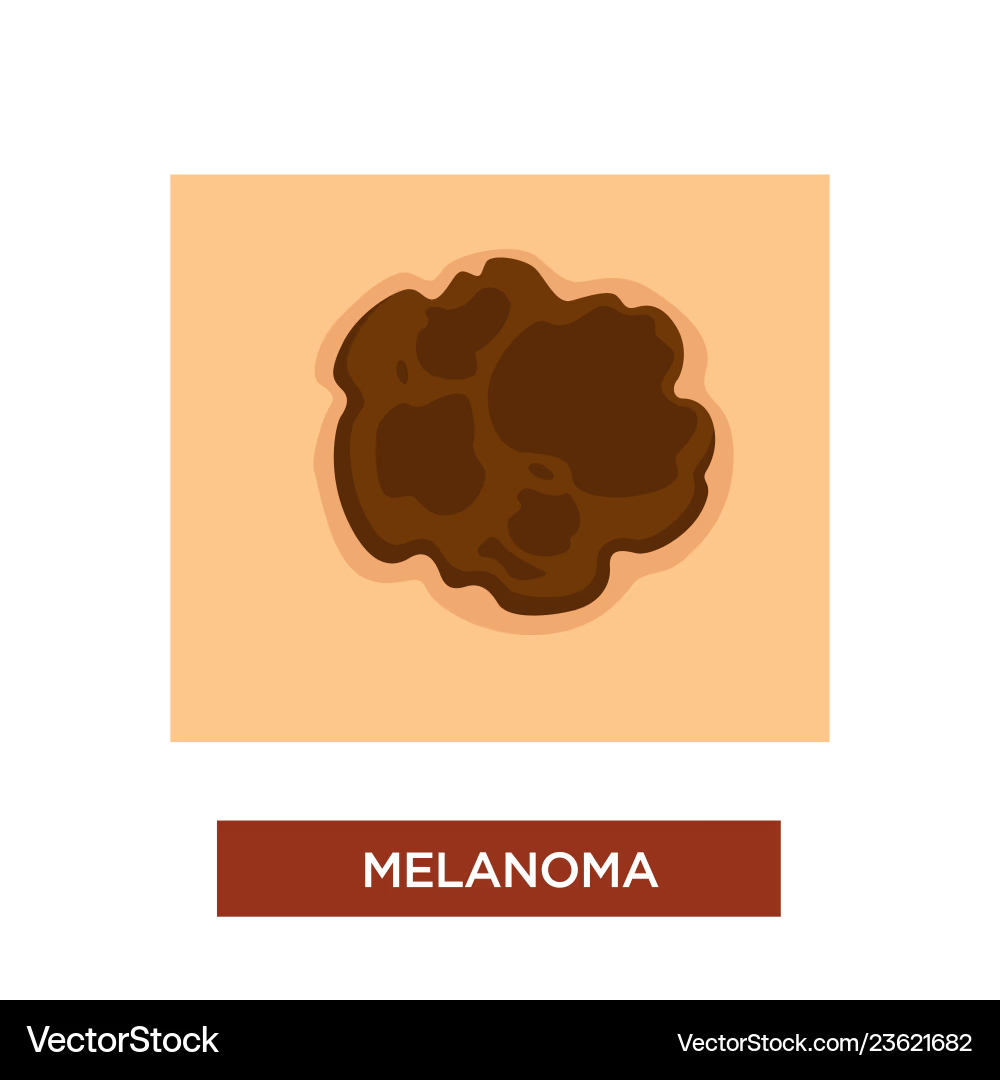Tissues and Integumentary Test Corrections #2
1/47
There's no tags or description
Looks like no tags are added yet.
Name | Mastery | Learn | Test | Matching | Spaced |
|---|
No study sessions yet.
48 Terms
Tissues are collections of specialized cells and cell products that perform a function
Collections of specialized cells and cell products that perform a function are…
Bone is not a tissue type
What is not considered a tissue type?
Fat or adipose tissue make up the hypodermis
The hypodermis is the deepest layer of skin. In fact, many don’t even consider it a part of skin, but instead it acts as an anchoring point for the layers above it. What type of connective tissue makes up the hypodermis?
The tissue with many cells surrounded by fibers and proteins would be connective tissue
Close examination of an organ reveals a tissue with many cells surrounded by fibers and proteins. Which of the following tissue types would this be?
Cardiac muscle is unstriated involuntary
A way of describing cardiac muscle tissue is…
The muscle tissue that shows no striations and is involuntary is smooth muscle
The muscle tissue which shows no striations and is involuntary is…
Epithelial tissue has a free surface since its avascular
Which tissue is characterized by always having a free surface?
Nervous tissue has electrical impulses
Tissue that is specialized for the conduction of electrical impulses is…
Being avascular, the cells get their nutrients through diffusion, therefore, they need to be in thin layers in order for nutrients to reach as many cells as possible
The reason epithelial tissue is found in thin layers is because…
Keratin is a chemical found in hair, nails or skin
What is the tough waterproof chemical that is in hair, nails or skin?
The three examples are:
Fibrocartilage
Hyaline cartilage
Fibrocartilage
Name three examples of connective tissue types:
Dysplasia is when cells don’t look right under a microscope
What is dysplasia?
The dermis is the layer below the epidermis and made up irregular and connective tissue
The layer below the epidermis, made mostly of dense irregular and loose connective tissue is the…
The three main layers of skin are the epidermis, dermis and hypodermis
The three main layers of skin (including the anchoring layer are…
The stratum corneum is the dead, keratinizied layer
The dead, keratinized layer found at the exterior surface of the skin is…
The hypodermis is composed mostly of adipose tissue
The layer that is composed mostly of adipose tissue is…
Stratum basale is known as the basement membrane
The layer of the epidermis that is also known as the basement membrane is…
Produced in higher amounts due to sun exposure
Produced by melanocytes
The pigment melanin is… Two of these for the question
Exposing your skin to ultraviolet light can result in increased production of melanin from melanocytes in the skin
Exposure of the skin to ultraviolet light is..
Vitamin D
Epidermal cells synthesize this vitamin when exposed to sunlight…
In individuals with albinism, the cell type that is NOT active is melanocytes
Albinism is a condition where the skin lacks pigment. Which cell type is NOT active in individuals with albinism?
The sebaceous glands are the glands that become overactive during puberty
The glands that become overactive during puberty and can lead to acne due to increased oil input are:
This type of perspiration is produced by apocrine glands, which are located in the armpits and groin. They become active after puberty begins
Perspiration that occurs only in the armpits and groin, and is only produced once puberty starts
Cancer is caused strictly by only environmental factors and NOT genetic ones
What is NOT a characteristic of cancer?
Cell phone radiation is not considered a carcinogen
What is NOT considered a carcinogen?
The characteristic that is NOT typical is cell undergoing apoptosis if damage occurs
Which of the following is NOT a characteristic of cancerous cells?
p53 is a protein that triggers apoptosis, if DNA is damaged, if it is non functional, the cell will not kill itself when damaged, causing mutations to accumulate that can cause cancer
Why is it that p53 is a community mutated gene and nonfunctional protein in cancers?
Arrector pilli muscle
Goose bumps form on the surface of the skin when… muscle contraction and extend the hairs on the surface of the skin
2nd degree burn
This type of burn is when the dermis and epidermis are damaged, resulting in blistering
3rd degree burn
The type of burn where all of the epidermis and the dermis is destroyed, and damage may go down to the hypodermis. All skin layers are destroyed…
1st degree burn
This type of burn appears inflamed and red, but has NO blisters. Only the epidermis is damaged
Malignant is a characteristic
What is a word for a characteristic of cancer cells that means they have THE ABILITY to spread to other parts of the body?
Cutaneous membrane
Synovial membrane
Serous membrane
Mucous membrane
What are the four membranes to know?
The mucous membrane is:
Moist
Specializes in secretion and absorption
What are the characteristics for the mucous membrane?
The serous membrane:
Lines internal organs
Serous fluid between each tissue layer
What are the characteristics for the serous membrane?
The cutaneous membrane is a:
Dry membrane
Provides protection
What are the characteristics for the cutaneous membrane?
The synovial membrane is the:
Only connective tissue membrane
Found in the joints
What are the characteristics for the synovial membrane?
Three reasons are:
Destroys entire skin layer
Opens up infection
Severe water loss
List 3 reasons why a 3rd degree burn is very serious:
The two main characteristics that differentiate epithelial types are the number of cell layers (simple or stratified) and the shape of cells (squamous, cuboidal, columnar).
Please discuss the two main characteristics that differentiate between different types of epithelium:
Simple cuboidal: Single layer of cube-shaped cells. Found in kidney tubules
Simple columnar: Single layer of tall cells. Found in lining of the stomach
Commonly found epithelium types and where they are found in or on the body:
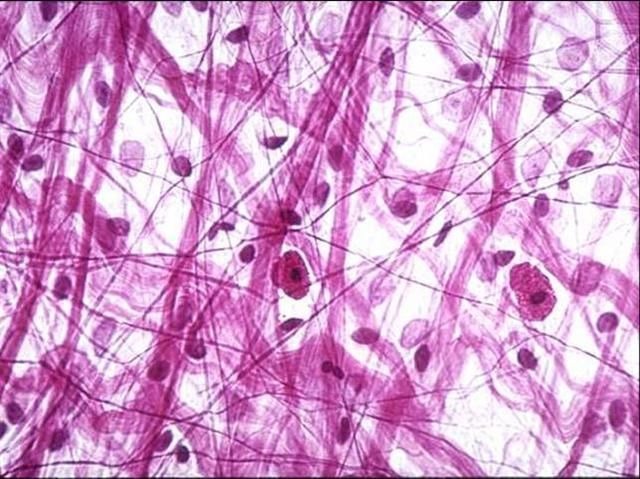
Picture example of areolar connective tissue:
What is a picture example of areolar connective tissue?
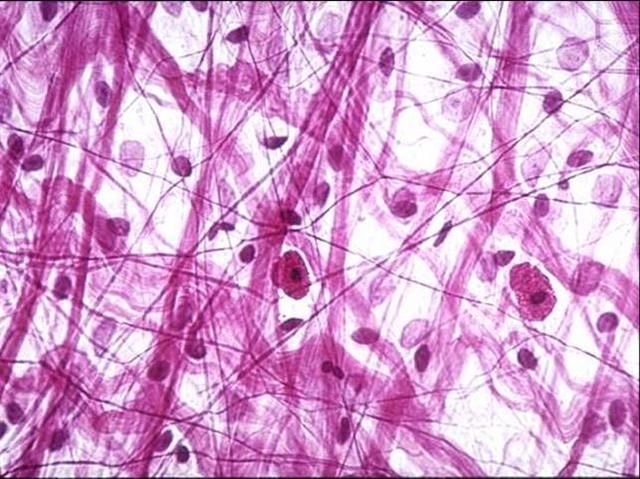
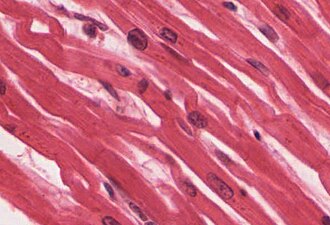
Picture example of cardiac muscle:
What is a picture example of cardiac muscle?
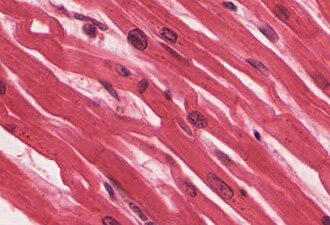
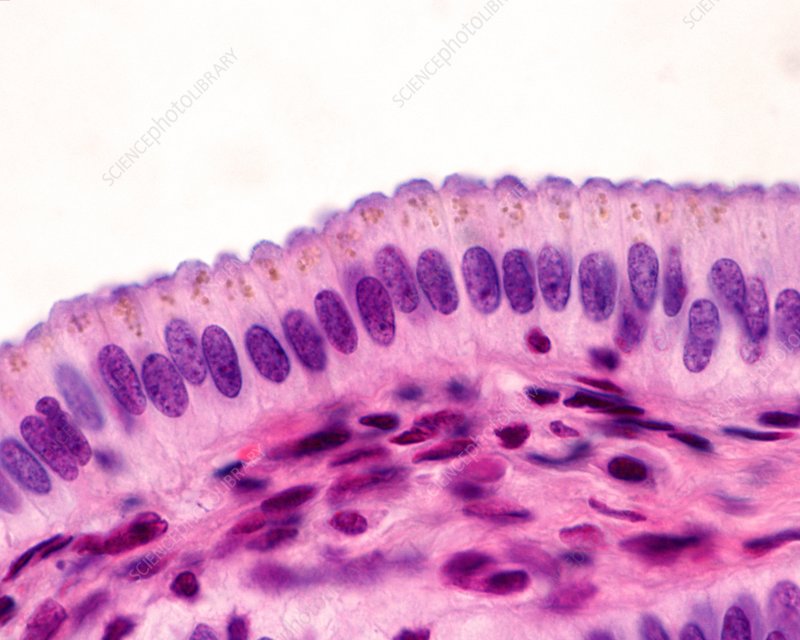
Picture example of simple columnar epithelium:
What is a picture example of simple columnar epithelium?
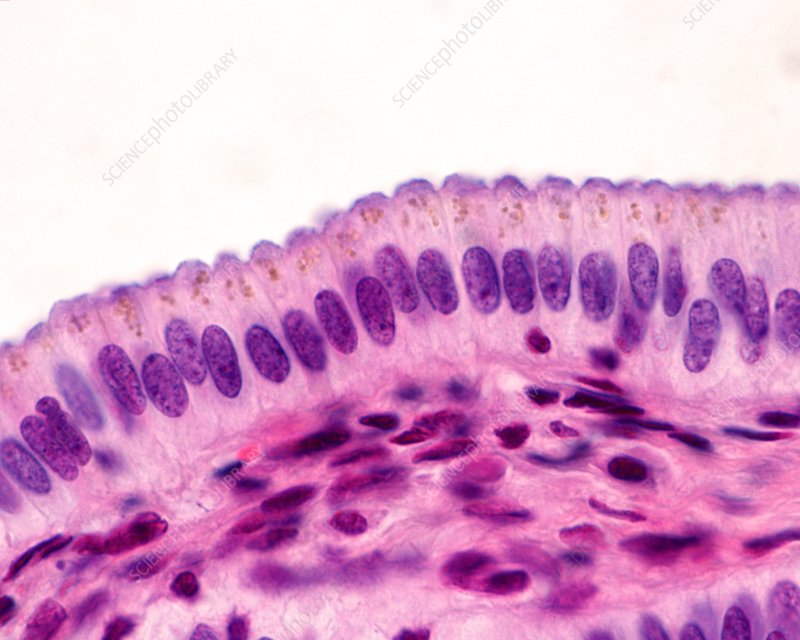
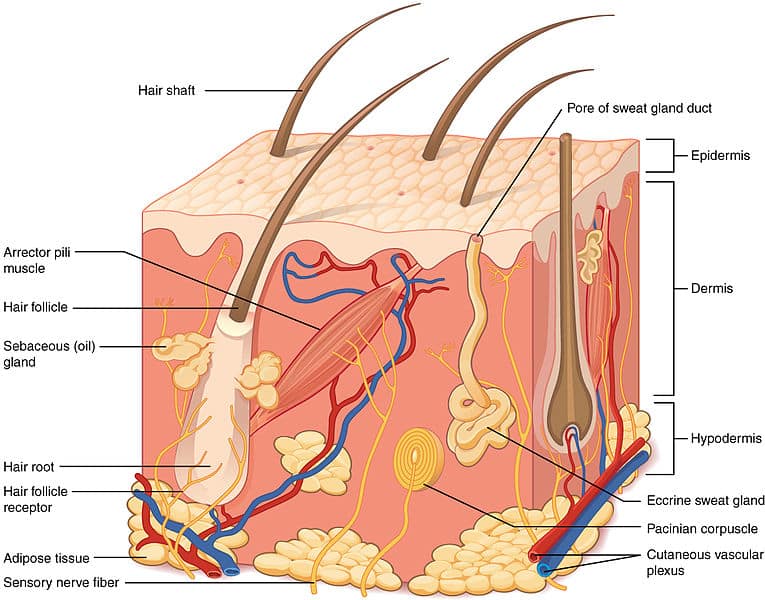
Picture example of skin structure labeled:
What is a picture example with skin structure labeled?
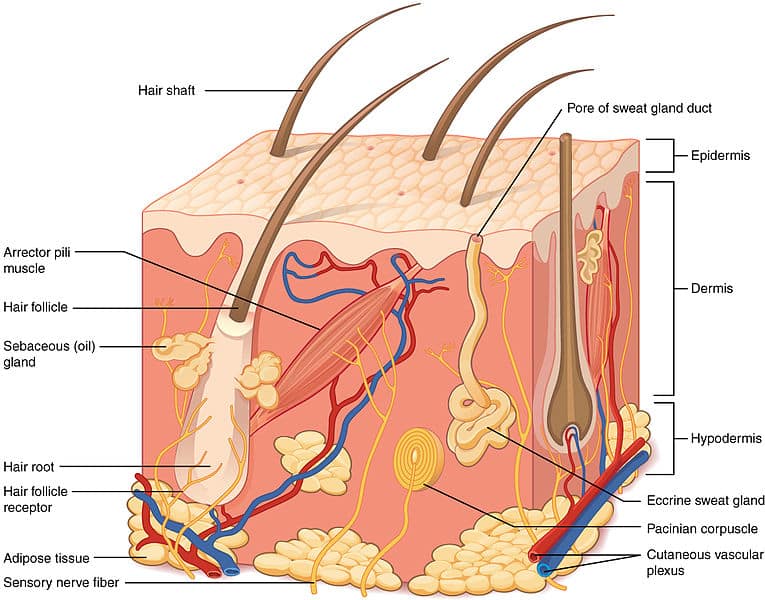
Mutations in oncogenes and the p53 tumor suppressor gene disrupt the cell cycle, causing cells to divide uncontrollably and leading to cancer
Please discuss how mutations in specific types of genes can lead to cancer:
Oncogene acts like a stuck gas pedal, promoting constant cell division
p53 acts like a broken brake, failing to stop the cell cycle or initiate apoptosis when faced with DNA damage
Cancer cells differ from normal cells because they divide constantly and grow without normal growth signals
How do these mutations cause cancer to have different characteristics from normal cells (discuss characteristics)?
Oncogenes’s gas pedals and the mutated p53 genes lose their brake and repair functions
This leads to cells that divide uncontrollably and fail to die when damaged
You should at least have 2 different types of genes and proper descriptions of each and how failure in their normal job will lead to cancer:

I believe that this type of cancer is malignant melanoma. I can use Asymmetry and Color to guess this
It is asymmetry because one half of the spot does not match the other half in shape or size
The color is not the same all over and includes different shades of color as well
Please explain whether you believe this to be cancerous or not and the type of cancer if it likely is if it is cancerous.
